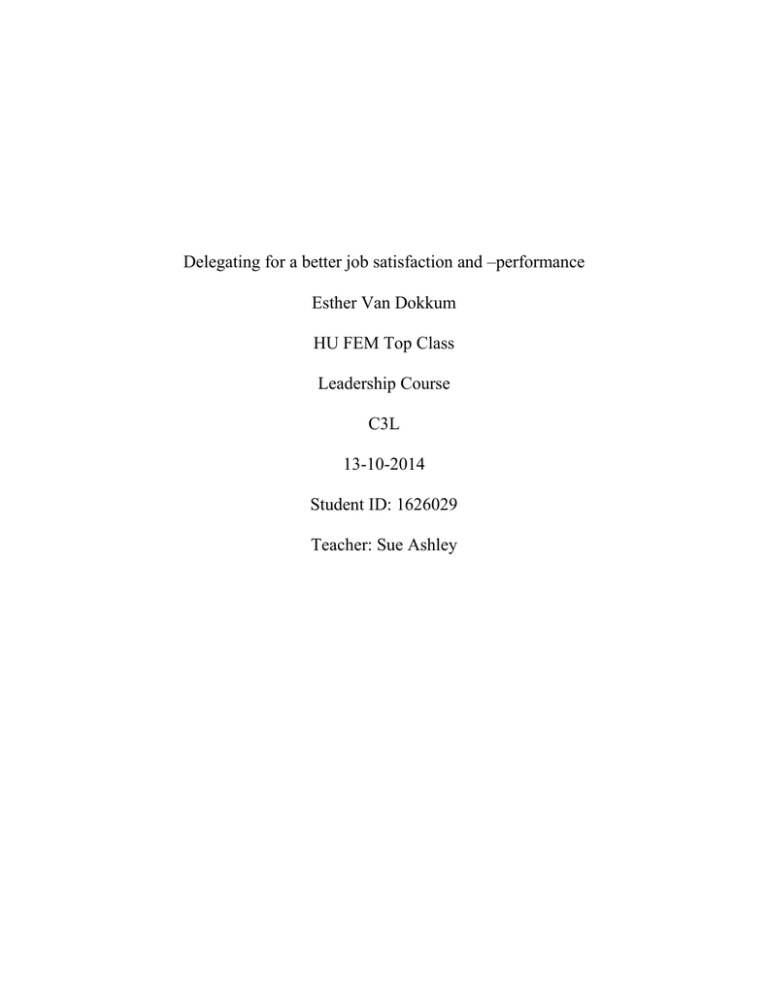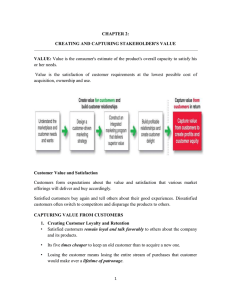Delegating for a better job satisfaction and –performance
advertisement

Delegating for a better job satisfaction and –performance Esther Van Dokkum HU FEM Top Class Leadership Course C3L 13-10-2014 Student ID: 1626029 Teacher: Sue Ashley DELEGATING FOR A BETTER JOB SATISFACTION AND –PERFORMANCE 2 Table of contents Introduction and Rationale 3 Outline 5 Reference list 8 Appendix Appendix 1: Themes in articles 10 Appendix 2: Thesis, antithesis and synthesis 13 DELEGATING FOR A BETTER JOB SATISFACTION AND –PERFORMANCE 3 Introduction and Rationale Leaders of today’s businesses need to have knowledge, abilities and skills to effectively deal with the constant organizational changes. Nowadays, businesses operate in constantly changing environments such as mergers and acquisitions, the 24/7 economy as well as managing new forms of work processes. Businesses have become flatter, which allows employees’ to work more in a self-directed manner and having a greater autonomy (Vidyarthi, P. et al, 2014). These developments require a different approach to leadership. Leadership is generally described as an interpersonal process in which a leader influences followers (Danserau et al, 2013). Leadership can be defined as a process whereby intentional influence is exerted by one person over other people to guide, structure, and facilitate activities and relationships in a group or organization (Vidyarthi, P. et al, 2014). A leader interacts with people inside and outside of the organization. In order to make these interactions as successful as possible, the leader needs to shift in order to meet the demands and desires of followers, colleagues and superiors. The main focus of this article is the Situational Leadership Strategy by Hersey and Blanchard. It was originally called life cycle theory and is a leadership approach in which leader behavior is determined by psychological factors (Danserau et al, 2013). The situational leadership model consists of Task Behavior and Relationship Behavior. The leader, when applying Situational Leadership can use four different leadership styles; Directing (S1), Coaching (S2), Supporting (S3) and Delegating (S4) also known as Telling, Selling, Participating and Delegating (Shahmandi, E. et al, 2011). The previously mentioned factors determine which leadership style the leader uses. DELEGATING FOR A BETTER JOB SATISFACTION AND –PERFORMANCE 4 The researcher has worked at a commercial company in the role of Project Manger. The director of this company mainly uses the Situational Leadership style: Delegating (S4). This fact triggered the following research question: What is the effect on job satisfaction and job performance of employees’ when they have a leader who mainly uses the Delegating (S4) style of the Situational Leadership strategy? The main purpose of this research is to provide an insight into Situational Leadership especially delegating. Under which circumstances it is most effective to use the S4 Delegating style and how it can attribute in increasing job performance and – satisfaction. In order to provide a solid answer to the research question a comprehensive literature study has been conducted. This literature study consisted out of nine scientific peer-to-peer reviewed articles. DELEGATING FOR A BETTER JOB SATISFACTION AND –PERFORMANCE 5 Outline In this section the main theme per paragraph will be: Abstract Introduction / rationale Thesis Defining leadership o Dansereau, F., & Seitz, S.F., & Chiu, C., & Shaughnessy, B., & Yammarino, F.J. (2013) o Shahmandi, E., & Silong, A.D., & Ismail, I.A., & Samah, B.B.A., & Othman, J. (2011) o Yurtkoru, E.S.N., & Ekmekci, A.K. (2011). Leadership characteristics o Dansereau, F., & Seitz, S.F., & Chiu, C., & Shaughnessy, B., & Yammarino, F.J. (2013) o Shahmandi, E., & Silong, A.D., & Ismail, I.A., & Samah, B.B.A., & Othman, J. (2011) o Slamet, & Toyib, A., & Hadiwidjojo, D., & Troena, E.A. (2013) o Vidyarthi, P.R., & Anand, S., & Liden, R. C. (2014) o Yurtkoru, E.S.N., & Ekmekci, A.K. (2011) o Zhang, S., & Tremaine, M., & Egan, R., & Milewski, A., & O’sullivan, P., & Fjermestad, J. (2009). Situational leadership DELEGATING FOR A BETTER JOB SATISFACTION AND –PERFORMANCE 6 o Dansereau, F., & Seitz, S.F., & Chiu, C., & Shaughnessy, B., & Yammarino, F.J. (2013) o Shahmandi, E., & Silong, A.D., & Ismail, I.A., & Samah, B.B.A., & Othman, J. (2011) o Slamet, & Toyib, A., & Hadiwidjojo, D., & Troena, E.A. (2013) o Yurtkoru, E.S.N., & Ekmekci, A.K. (2011) o Zhang, S., & Tremaine, M., & Egan, R., & Milewski, A., & O’sullivan, P., & Fjermestad, J. (2009). Delegation and Coaching o Ferguson, T.D., & Cheek, R. (2011) o Rosch, A. (2014) o Shahmandi, E., & Silong, A.D., & Ismail, I.A., & Samah, B.B.A., & Othman, J. (2011) o Slamet, & Toyib, A., & Hadiwidjojo, D., & Troena, E.A. (2013) o Vidyarthi, P.R., & Anand, S., & Liden, R. C. (2014) o Zhang, S., & Tremaine, M., & Egan, R., & Milewski, A., & O’sullivan, P., & Fjermestad, J. (2009). Job satisfaction o Ferguson, T.D., & Cheek, R. (2011) o Intaraprasong, W., & Potjanasitt, S., & Pattaraarchachai, J., & Meennch, C. (2012) o Slamet, & Toyib, A., & Hadiwidjojo, & D., Troena, E.A. (2013) Job performance DELEGATING FOR A BETTER JOB SATISFACTION AND –PERFORMANCE 7 o Intaraprasong, W., & Potjanasitt, S., & Pattaraarchachai, J., & Meennch, C. (2012) o Shahmandi, E., & Silong, A.D., & Ismail, I.A., & Samah, B.B.A., & Othman, J. (2011) o Slamet, & Toyib, A., & Hadiwidjojo, D., & Troena, E.A. (2013) o Vidyarthi, P.R., & Anand, S., & Liden, R. C. (2014) o Zhang, S., & Tremaine, M., & Egan, R., & Milewski, A., & O’sullivan, P., & Fjermestad, J. (2009). Delegating (thesis and antithesis) o Intaraprasong, W., & Potjanasitt, S., & Pattaraarchachai, J., & Meennch, C. (2012) o Slamet, & Toyib, A., & Hadiwidjojo, D., & Troena, E.A. (2013) o Vidyarthi, P.R., & Anand, S., & Liden, R. C. (2014) o Zhang, S., & Tremaine, M., & Egan, R., & Milewski, A., & O’sullivan, P., & Fjermestad, J. (2009). Synthesis and conclusion DELEGATING FOR A BETTER JOB SATISFACTION AND –PERFORMANCE 8 References Dansereau, F., & Seitz, S.F., & Chiu, C., & Shaughnessy, B., & Yammarino, F.J. (2013). What makes leadership, leadership? Using self-expansion theory to integrate traditional and contemporary approaches. The leadership Quarterly 24, 798-821. doi 10.1016/j.leaqua.2013.10.008 Ferguson, T.D., & Cheek, R. (2011). How Important Are Situational Constraints in Understanding Job Satisfaction? International Journal of Business and Social Science. 2(22), 211-227. Retrieved from http://www.ijbssnet.com/journals/Vol_2_No_22_December_2011/25.pdf Intaraprasong, W., & Potjanasitt, S., & Pattaraarchachai, J., & Meennch, C. (2012). Situational Leadership Styles, Staff Nurse Job Characteristics Related to Job Satisfaction and Organizational Commitment of Head Nurses Working in Hospitals under the Jurisdiction of The Royal Thai Army. J. Med. Assoc. Thai., 95(6), 109-119. Retrieved from http://www.ncbi.nlm.nih.gov/pubmed/23130496 Rosha, A.(2014). Peculiarities of manifestation of coaching in organizations. Procedia Social and Behavioral Sciences 110, 852-860. doi 10.1016/w.sbspro.2013.12.930. Shahmandi, E., & Silong, A.D., & Ismail, I.A., & Samah, B.B.A., & Othman, J. (2011). Competencies, Roles and Effective Academic Leadership in World Class University. International Journal of Business Administration, 2(1), 44-53. doi 10.5430/ijba.v2n1p44 Slamet, & Toyib, A., & Hadiwidjojo, D., & Troena, E.A. (2013). The Influence of Situational Leadership on Job Satisfaction and Job Performance ( A Study on Trans Jakarta Bus way as Transportation Service in DKI Jakarta) Global Advanced Research Journal of Management and Business studies, 2(2), 105-113. ISSN:2315-5086 Vidyarthi, P.R., & Anand, S., & Liden, R. C. (2014). Do emotionally perceptive leaders motivate DELEGATING FOR A BETTER JOB SATISFACTION AND –PERFORMANCE 9 higher employee performance? The moderating role of task interdependence and power distance. The Leadership Quarterly 25, 232-244. doi 10.1016/j.leaqua.2013.08.003 Yurtkoru, E.S.N., & Ekmekci, A.K. (2011). Actual and Ideal Leadership Behavior shift within the last Five Years. Procedia Social and Behavioral Sciences 24, 1451-1459. doi 10.1016/j.sbspro.2011.09.030 Zhang, S., & Tremaine, M., & Egan, R., & Milewski, A., & O’sullivan, P., & Fjermestad, J. (2009). Occurrence and Effects of Leader Delegation in Virtual Software Teams. IGI Publishing, 5(1), 47-69. doi 10.4018/978-1-60960-466-0.CH004 DELEGATING FOR A BETTER JOB SATISFACTION AND –PERFORMANCE 10 Appendix 1: Themes in articles Dansereau, F., & Seitz, S.F., & Chiu, C., & Shaughnessy, B., & Yammarino, F.J. (2013). What makes leadership, leadership? Using self-expansion theory to integrate traditional and contemporary approaches. The leadership Quarterly 24 798-821 doi 10.1016/j.leaqua.2013.10.008 The central theme of the article is to unify traditional and contemporary leadership approaches into one unified approach called self – expansion. By doing so the researches want to improve the effectiveness of the different leadership styles. The research shows that there are many different leadership styles, but the question remains in which situation to use which leadership style. Ferguson, T.D., & Cheek, R. (2011). How Important Are Situational Constraints in Understanding Job Satisfaction? International Journal of Business and Social Science. 2(22), 211-227. Retrieved from http://www.ijbssnet.com/journals/Vol_2_No_22_December_2011/25.pdf The article revolves around the theme of job satisfaction and which situational constraints have an effect on the job satisfaction employees. The purpose of the article is to provide a more complete understanding of contextual job – related factors, the relationship between job satisfaction and situational constraints and to present employers with an sight on how to improve job satisfaction. By improving the job satisfaction rate the company can be more efficient and effective. Intaraprasong, W., & Potjanasitt, S., & Pattaraarchachai, J., & Meennch, C. (2012). Situational Leadership Styles, Staff Nurse Job Characteristics Related to Job Satisfaction and Organizational Commitment of Head Nurses Working in Hospitals under the Jurisdiction of The Royal Thai Army. J. Med. Assoc. Thai., 95(6), 109-119. Retrieved from http://www.ncbi.nlm.nih.gov/pubmed/23130496 The central theme of the article is to provide a better understanding of job satisfaction and the different aspects that influence this. Besides that the article wants to improve the level of job satisfaction, work commitment in order to operate more effective. The researches found out that there is a relation between situational leadership and job satisfaction. Job satisfaction also consists of (personal) expectations and experiences. DELEGATING FOR A BETTER JOB SATISFACTION AND –PERFORMANCE 11 Rosha, A.(2014). Peculiarities of manifestation of coaching in organizations. Procedia Social and Behavioral Sciences 110, 852-860. doi 10.1016/w.sbspro.2013.12.930. Shahmandi, E., & Silong, A.D., & Ismail, I.A., & Samah, B.B.A., & Othman, J. (2011). Competencies, Roles and Effective Academic Leadership in World Class University. International Journal of Business Administration, 2(1), 44-53. doi 10.5430/ijba.v2n1p44 The theme of the article is to improve the efficiency of organizations by implementing coaching. Coaching is a good way to improve learning and development, leadership development and chance management. Coaching is an essential organizational intervention to increase individual awareness and it helps developing new knowledge and skills. Shahmandi, E., & Silong, A.D., & Ismail, I.A., & Samah, B.B.A., & Othman, J. (2011). Competencies, Roles and Effective Academic Leadership in World Class University. International Journal of Business Administration, 2(1), 44-53. doi 10.5430/ijba.v2n1p44 The main theme of the article is to lead research universities towards excellence. In order to accomplish this, academics leaders require certain competencies and perform the necessary roles to lead, by using all four roles (telling, selling, participating and delegating) of situational leadership. Slamet, & Toyib, A., & Hadiwidjojo, D., & Troena, E.A. (2013). The Influence of Situational Leadership on Job Satisfaction and Job Performance ( A Study on Trans Jakarta Bus way as Transportation Service in DKI Jakarta) Global Advanced Research Journal of Management and Business studies, 2(2), 105-113. ISSN:2315-5086 The theme of the article is to provide fundamental analysis of situational leadership, the way to implement it and to increase the level of job satisfaction and – performance. The researches found a positive correlation between implementing situational leadership and job satisfaction. The level of improvement of job satisfaction however does depend on the situation. The researches concluded that situational leadership causes a higher job satisfaction, which causes a higher performance. Job satisfaction needs to be monitored continuously and where necessary action should be taken. Vidyarthi, P.R., & Anand, S., & Liden, R. C. (2014). Do emotionally perceptive leaders motivate higher employee performance? The moderating role of task interdependence and power distance. The Leadership Quarterly 25, 232-244. doi 10.1016/j.leaqua.2013.08.003 The relationship between employees’ emotional intelligence and their job performance has been extensively researched. The research in the article examines the relation between the emotional intelligence of leaders and the (enhanced) performance of the employees’. The theme in the article is to DELEGATING FOR A BETTER JOB SATISFACTION AND –PERFORMANCE 12 improve the performance of the employees’ by showing the importance of having a high level of emotional intelligence by the management. Yurtkoru, E.S.N., & Ekmekci, A.K. (2011). Actual and Ideal Leadership Behavior shift within the last Five Years. Procedia Social and Behavioral Sciences 24, 1451-1459. doi 10.1016/j.sbspro.2011.09.030 The theme of the article is to provide insight in the evolution of a leader during the last five years. The article also shows that leaders might have become less person and system oriented but more productivity and transaction oriented. Zhang, S., & Tremaine, M., & Egan, R., & Milewski, A., & O’sullivan, P., & Fjermestad, J. (2009). Occurrence and Effects of Leader Delegation in Virtual Software Teams. IGI Publishing, 5(1), 47-69. doi 10.4018/978-1-60960-466-0.CH004 The central theme of the article is to provide insight of the influence and implementation of delegating leadership on team performances. Delegating leadership is possible when the level of the followers is at a certain independent level. At a lower level of competent the employee will need more close monitoring and coaching. DELEGATING FOR A BETTER JOB SATISFACTION AND –PERFORMANCE 13 Appendix 2: Thesis, antithesis and synthesis Thesis Delegating style (S4) from the Situational Leadership Strategy developed by Hersey and Blanchard will increase the job performance and job satisfaction of employees’. Antithesis Delegating style (S4) of Situational Leadership Strategy developed by Hersey and Blanchard is only suitable for teams when teams are mature in job performance and psychological. When the delegating style is applied on a not suitable team, the level of job satisfaction and performance will decrease. Synthesis A good leader continuously adapts his leadership style to match the current situation. All employees’ are different persons, with different personalities. Different tasks executed by various employees’ require different leadership styles.




